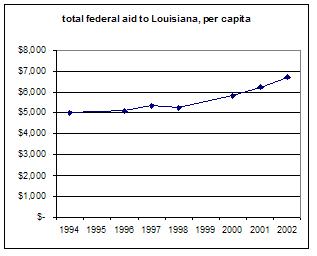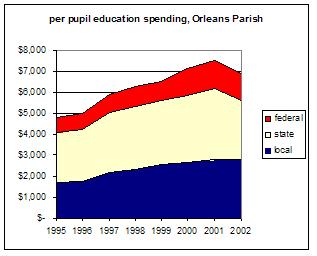« New Orleans: the youth/adult ratio and why it matters | Main | Miss Mary Bennet »
September 16, 2005
New Orleans: federal spending
In the aftermath of Katrina, an emerging line of argument goes like this: Bush is an anti-government conservative. Anti-government conservatives cut spending. Therefore, Bush cut spending. And the flooding has revealed the vulnerability of poor people when government spending is inadequate. I suspect that the real story is somewhat different. Bush is a profligate spender who borrows to finance rising expenditures. Cuts are coming, forced by the debt, but they have not happened yet. Therefore, it is generally inaccurate to attribute current social problems to Bush's spending cuts. The real culprits are decades, even centuries, of under-investment, plus very poorly managed government--both in big cities and, since 2000, at the federal level.
The full story is probably somewhat more complicated, since there have been federal cuts in some programs. I wish that financial data were more widely cited in the debate about what Katrina "means." In my limited discretionary time, I have created two graphs, both of which end in 2002. (More recent data are not easily found.)
The first shows that total federal spending per capita increased in Louisiana through 2002, although these numbers are not adjusted for inflation. Consistently, about 10% of the annual spending is for defense.
The second graph shows that spending per student in the Orleans Parish public schools rose, but then fell in the 2002-3 school year, mainly because of a drop in state support. Again, these figures are not adjusted for inflation.
I acknowledge that these are just snippets of information, and I'd welcome more detail about any actual Bush spending cuts that might have affected citizens of New Orleans.
September 16, 2005 3:42 PM | category: Katrina | Comments
Comments
Yes, Bush has in fact presided over an increase in non-defense discretionary spending, particularly in education.
However, the Bush budget has consistently underfunded the Army Corps of Engineers, and the ACE has prioritized construction projects that help a dwindling number of politically connected shipping firms. Corps spending in the congressional district that includes New Orleans has dropped in nominal dollars from $147m to $82m.
http://markschmitt.typepad.com/decembrist/2005/09/not_more_spendi.html
http://www.washingtonmonthly.com/features/2005/0505.lambrecht.html
http://www.govexec.com/dailyfed/0905/090105jv1.htm
The other main point of criticism is that FEMA is not professionally staffed. It has, by most estimates 10 times employees as many political appointees and quasi-appointees (people who are not expressly political appointments, but who likely got their jobs thanks to political connections) as most other agencies, as a percentage of employees. Further, because FEMA is now a subagency of DHS, it has de-prioritized its basic disaster relief mission in favor of terrorism prevention. Also, the change from a liberal government to a quasi-conservative government may have changed FEMA's perception of its role, from one where it proactively took steps in disaster relief to one where it acted in a purely reactive mode.
September 16, 2005 5:37 PM | Comments (2) | posted by Nick Beaudrot
and of course, it isn't just money, it is how you spend it. Bush spent money on No Child Left Behind, sometimes, and much of it went to standardized tests and other such "mandates" which most practicing teachers will tell you are making things worse, not better. the problem with looking at federal education dollars is that most education dollars come from the state, and the federal dollars that do come in are often earmarked for specific federal programs (like testing the bejesus out of kids).
September 22, 2005 2:26 AM | Comments (2) | posted by mwallae1

